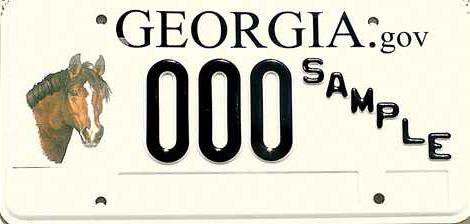0814horseaud
Robert Dwyre, director of Chicopee Woods Agricultural Center, talks about how the horse industry benefits the economy.Guess which farm product brings more revenue into Georgia than peaches, pecans or peanuts?
Horses.
Most people don’t think about horses as a product, since they aren’t raised for consumption. But in 2007, direct expenditures on horses were worth $429 million to Georgia’s economy. On the Georgia farm gate list, horses edged past beef to rank as the fifth most valuable farm commodity, topped only by broilers, cotton, eggs and timber.
To raise awareness about the importance of horses, in 2006 the Georgia General Assembly created an agricultural commodity commission to promote the equine industry. The commission’s programs would be funded largely through proceeds from a new specialty license plate.
Horse enthusiasts throughout the state voted on their favorite plate design, and the winning entry was unveiled in March. But to start manufacturing a new specialty plate, the Georgia Department of Revenue requires 1,000 pre-orders.
That magic number was reached on July 24, and the Georgia Equine Tag soon will be available.
C.J. Farmer can’t wait to get hers. She owns Grove River Ranch, a horse farm in Banks County near Gillsville, and she ordered a tag as soon as they went on sale.
"We’re very happy about it," she said, speaking about people in the horse community. "We pump a lot of money into the economy, even though we don’t make a product for human consumption."
But Farmer said the equine industry is hurting this year.
"I’ve never seen so many people who had to give up their horses because they couldn’t afford to keep them anymore," she said.
John Clements, a member of the state equine commission, said there’s no denying that it’s expensive to own a horse. But that’s precisely why horses are so valuable to the economy.
"The amount listed on the farm gate report is just the direct value," he said. "They’re not even factoring in the broader economic impact, like the gas that people purchase when they drive to horse shows."
Clements said in addition to promoting the equine industry, the commission also wants to fund research and education.
"You’d be surprised at how many people buy a horse and have no idea what to do with it," he said. "They don’t know that the cheapest part of owning a horse is the initial purchase. They don’t realize that the expression ‘to eat like a horse’ is true."
But Clements said most people who love horses are willing to make sacrifices in other areas of their lives in order to keep these animals. They are reliable customers who purchase hay and feed and who call in veterinarians and farriers to provide regular care to their horses.
Many also are involved in some type of equestrian sport and are willing to travel for their hobby.
Robert Dwyre, director of the Chicopee Woods Agricultural Center in Gainesville, said the center couldn’t stay in business without equestrian events.
"I’d say 90 percent of what we do here is horses," he said. "To bring money into the facility, horse shows are the way to go."
Dwyre said on average, two or three people accompany each horse to a show. They buy merchandise from vendors selling saddles, tack, riding clothing and other horse-related items.
They also spend money outside of the arena. Dwyre said many show participants travel here from other counties or states. They stay in hotels, buy gas, eat in restaurants, go shopping or to the movies.
"It is a big benefit to the community (to have visitors in Hall County)," he said.
But Dwyre would be happy to attract even more equestrians, and he thinks the new license plate is a good idea.
"Obviously it could not hurt. It could only help," he said. "It would bring attention to the horses."

